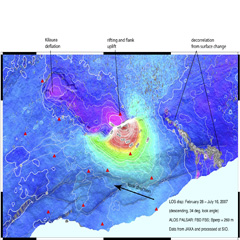- Software and libraries
- Interferometric synthetic aperture radar (InSAR)
- Performing tropospheric noise corrections
- Multitemporal/time series InSAR analysis
- Simulator
- Data
RaySAR is a 3D synthetic aperture radar (SAR) simulator which enables to generate SAR image layers related to detailed 3D object models. Moreover, it enables one to localize the 3D positions and surface intersection points related to reflected radar signals. In particular, RaySAR helps to understand the nature of signal multiple reflections at man-made objects (e.g. building structures) or artificial shapes. Scene models with different levels of detail can be processed - from digital surface models (DSMs) to high-end 3D structures - which can be defined in relative or absolute world coordinates. RaySAR can be run on Windows / Linux and is based on an adapted version of the open-source ray tracer POV-Ray.
- site: https://www.researchgate.net/profile/Stefan_Auer/publications
- sources: https://github.com/StefanJAuer/RaySAR
The code in this folder is a synthetic aperture radar (SAR) simulator. It was written for my thesis called "SAR imaging with a hand-held UWB radar system" at Blekinge Institute of Technology in Karlskrona, Sweden, and served the purpose of simulating SAR images, as well as processing real radar images.
FFTW is a C subroutine library for computing the discrete Fourier transform (DFT) in one or more dimensions, of arbitrary input size, and of both real and complex data (as well as of even/odd data, i.e. the discrete cosine/sine transforms or DCT/DST).
- site: http://www.fftw.org
- sources: https://github.com/FFTW/fftw3
PyAPS is a python module that estimates differential phase delay maps due to the stratified atmosphere for correcting radar interferograms.
GMTSAR is an open source (GNU General Public License) InSAR processing system designed for users familiar with Generic Mapping Tools (GMT). The code is written in C and will compile on any computer where GMT and NETCDF are installed.
The Western North America InSAR (WInSAR) Consortium was established by a group of practicing scientists and engineers to facilitate collaboration in, and advancement of, Earth science research using radar remote sensing. Its members are universities, research laboratories, and public agencies. WInSAR oversees the acquisition and archiving of spaceborne SAR data over western North America for the benefit of the membership.



